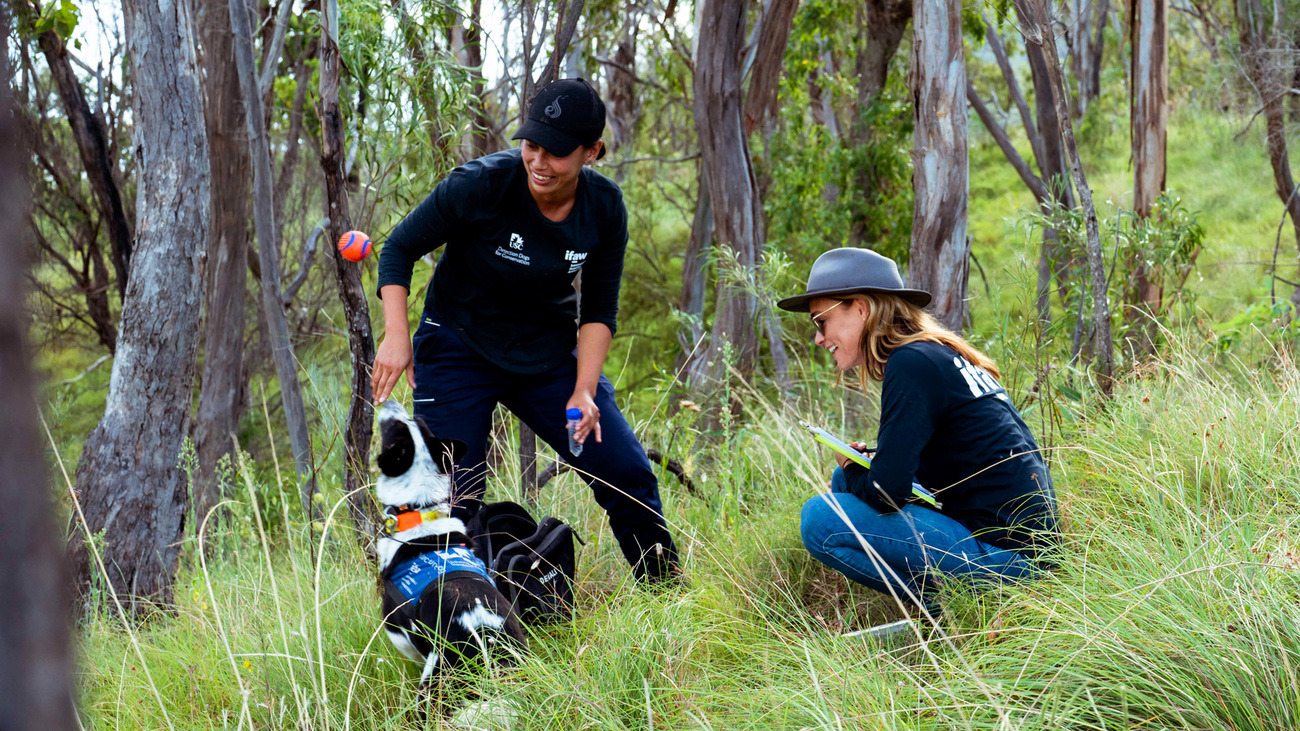Koala Habitat Protection with Detection Dogs – Australia
In Australia, detection dogs are a koala’s best frienddetection dogs helping koala conservation study one poo at a time
detection dogs helping koala conservation study one poo at a time

17 May 2022 – Hundreds of koala droppings sniffed out by detection dogs are being analysed to help experts understand how koalas are recovering after the Black Summer bushfires.
The International Fund for Animal Welfare (IFAW) and the University of the Sunshine Coast (USC) Detection Dogs for Conservation (DDC) team have been collaborating on a ground-breaking research project to discover how resilient koalas are to natural disasters and to improve conservation outcomes for the species.
Immediately after the bushfires, USC x IFAW koala detection dog Bear was sent to try and locate surviving koalas on the property of Australian TV presenter, conservationist and IFAW Ambassador Tyson Mayr’s family property in southern Queensland. The property was significantly impacted by the catastrophic 2019-20 bushfires. While no koalas were found within Tyson’s property at the time, Bear did find koalas in a nearby area affected by the same fire.
As part of the research project, detection dog Billie-Jean was later deployed to re-assess the property and found 21 fresh koala scat samples from eight individual koalas. The eight-year-old Australian Koolie dog was deployed again earlier this year and found 12 samples.
"It has been a hard two years for everyone around the world. After the devastating bushfires, we had plans to revisit this koala population multiple times, but COVID had different plans for us all. Finally, we are excited to be in the field again,” Director of the DDC Dr Romane Cristescu said.
“We are hopeful that what we find this year—two years post fire—will bring some much-needed good news. The first round of surveys taught us that even in fire-devastated landscapes, we could locate surviving koalas. Now we will look at health markers, and also compare the number of individuals we detected in each survey, to build a picture of the species resilience to such events."
IFAW Landscape Conservation Program Officer Wendy Simpson said the research is more critical than ever given koalas in Queensland, New South Wales and the Australian Capital Territory are now listed as Endangered.
“We know the fires significantly impacted these koala populations, and we hope through this research we can better understand koala health and how we can help koalas not just survive, but thrive going forward,” she said.
“Anything that we can learn from the tragedy that helps us protect koalas into the future is important.”
The samples will be analysed, along with the hundreds of others collected from bushfire impacted sites across Queensland and NSW to give an insight into how the disaster impacted koala health, for example by looking at hormone levels, gut microbiome or pathogen prevalence. The research aims to determine how resilient koalas are after natural disasters and the recovery potential of koala populations.
The IFAW-funded study will also inform research across Australia on why some koala populations–even those living in healthy habitats–are struggling to survive.
“We live in a world where it’s so easy to forget about what’s important as we move on to the next trending topic, but our koalas need our help now more than ever,” Tyson said.
“When you go onsite with IFAW and DDC you are often scaling through tough and rugged terrain while the blistering hot sun blasts across you. It is not easy work and it often goes unsung, but its work like this that is truly helping make the difference in the fight for the koala species.”
ENDS
Photos and videos available here.
Notes: Billie-Jean helps find koala scats, which are nearly invisible to the human eye on the forest floor, and is one of five dogs in the DDC team. Each one is as talented as USC x IFAW koala detection dog Bear who is trained to detect live koalas through the scent of their fur. He became world-famous after he was praised by American actors Tom Hanks and Leonardo DiCaprio on social media.
Press Contact
IFAW Australia
Dominica Mack
m: 0460 432 901
About the International Fund for Animal Welfare (IFAW) - The International Fund for Animal Welfare is a global non-profit helping animal and people thrive together. We are experts and everyday people, working across seas, oceans and in more than 40 countries around the world. We rescue, rehabilitate and release animals, and we restore and protect their natural habitats. The problems we’re up against are urgent and complicated. To solve them, we match fresh thinking with bold action. We partner with local communities, governments, non-governmental organisations and businesses. Together, we pioneer new and innovative ways to help all species flourish. See how at ifaw.org
About the University of the Sunshine Coast (USC) - USC is ranked by students as one of Australia's best universities for teaching quality and overall student experience. USC offers hands-on learning and flexible study options across more than 120 programs, at a network of teaching locations between Moreton Bay and the Fraser Coast. All USC programs include practical training or internships, and a focus on the core skills students need to succeed in the future workplace. Employers rate USC as one of the best universities for producing job-ready graduates. USC's international reputation for research is growing every year, with 26 research fields rated at world standard or above. Leading research areas include environmental sciences, nursing, medical and health sciences, biological sciences, engineering, technology, psychology, agricultural and veterinary sciences, human studies and communication. USC is committed to unlocking the innovation, productivity and full potential of our regions, and to working with government, industry and community to encourage prosperity in a knowledge-driven world.
Related content
Our work can’t get done without you. Please give what you can to help animals thrive.